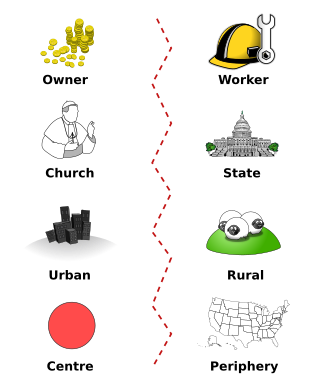Populism is a range of political stances that emphasize the idea of "the people" and often juxtapose this group with "the elite". It is frequently associated with anti-establishment and anti-political sentiment. The term developed in the late 19th century and has been applied to various politicians, parties and movements since that time, often as a pejorative. Within political science and other social sciences, several different definitions of populism have been employed, with some scholars proposing that the term be rejected altogether.
The term "illiberal democracy" describes a governing system that hides its "nondemocratic practices behind formally democratic institutions and procedures". There is a lack of consensus among experts about the exact definition of illiberal democracy or whether it even exists.
Tianxia, literally 'under Heaven', is a Chinese term for a historical Chinese cultural concept that denoted either the entire geographical world or the metaphysical realm of mortals, and later became associated with political sovereignty. In ancient China and imperial China, tianxia denoted the lands, space, and area divinely appointed to the Chinese sovereign by universal and well-defined principles of order. The center of this land was directly apportioned to the Chinese court, forming the center of a world view that centered on the Chinese court and went concentrically outward to major and minor officials and then the common subjects, tributary states, and finally ending with fringe barbarians.

Timothy David Snyder is an American historian specializing in the history of Central and Eastern Europe, the Soviet Union, and the Holocaust. He is the Richard C. Levin Professor of History at Yale University and a permanent fellow at the Institute for Human Sciences in Vienna.

Right-wing populism, also called national populism and right-wing nationalism, is a political ideology that combines right-wing politics with populist rhetoric and themes. Its rhetoric employs anti-elitist sentiments, opposition to the Establishment, and speaking to or for the "common people". Recurring themes of right-wing populists include neo-nationalism, social conservatism, economic nationalism and fiscal conservatism. Frequently, they aim to defend a national culture, identity, and economy against perceived attacks by outsiders. Right-wing populism has remained the dominant political force in the Republican Party in the United States since the 2010s.

In political science and sociology, a cleavage is a historically determined social or cultural line which divides citizens within a society into groups with differing political interests, resulting in political conflict among these groups. Social or cultural cleavages thus become political cleavages once they get politicized as such. Cleavage theory accordingly argues that political cleavages predominantly determine a country's party system as well as the individual voting behavior of citizens, dividing them into voting blocs. These blocs are distinguished by similar socio-economic characteristics, who vote and view the world in a similar way. It is distinct from other common political theories on voting behavior in the sense that it focuses on aggregate and structural patterns instead of individual voting behaviors.

Liberal democracy, western-style democracy, or substantive democracy is a form of government that combines the organization of a representative democracy with ideas of liberal political philosophy.
Authoritarianism is a political system characterized by the rejection of democracy and political plurality. It involves the use of strong central power to preserve the political status quo, and reductions in the rule of law, separation of powers, and democratic voting. Political scientists have created many typologies describing variations of authoritarian forms of government. Authoritarian regimes may be either autocratic or oligarchic and may be based upon the rule of a party or the military. States that have a blurred boundary between democracy and authoritarianism have some times been characterized as "hybrid democracies", "hybrid regimes" or "competitive authoritarian" states.

Left-wing populism, also called social populism, is a political ideology that combines left-wing politics with populist rhetoric and themes. Its rhetoric often includes elements of anti-elitism, opposition to the Establishment, and speaking for the "common people". Recurring themes for left-wing populists include economic democracy, social justice, and scepticism of globalization. Socialist theory plays a lesser role than in traditional left-wing ideologies.

Political globalization is the growth of the worldwide political system, both in size and complexity. That system includes national governments, their governmental and intergovernmental organizations as well as government-independent elements of global civil society such as international non-governmental organizations and social movement organizations. One of the key aspects of the political globalization is the declining importance of the nation-state and the rise of other actors on the political scene. The creation and existence of the United Nations is called one of the classic examples of political globalization.
The middle income trap is an economic development situation in which a country that attains a certain income gets stuck at that level. The term was introduced by the World Bank in 2007 who defined it as the 'middle-income range' countries with gross national product per capita that has remained between $1,000 to $12,000 at constant (2011) prices.

Trumpism is a political movement that follows the political ideologies associated with Donald Trump and his political base. It incorporates ideologies such as right-wing populism, national conservatism, neo-nationalism, and has also been described as being authoritarian and neo-fascist. Trumpist rhetoric heavily features anti-immigrant, xenophobic, nativist, and racist attacks against minority groups. Other identified aspects include conspiracist, isolationist, Christian nationalist, evangelical Christianity, protectionist, anti-feminist, and anti-LGBT beliefs. Trumpists and Trumpians are terms that refer to individuals exhibiting its characteristics.
American Tianxia is a term coined by the historian Wang Gungwu in 2013 to refer to the contemporary global order centered on the United States. It was further developed by sociologist Salvatore Babones to analyze today's millennial world-system through the lens of the Chinese concept of tianxia, meaning "all under heaven." While the United States is often called an "empire," this is a historically loaded term that is associated with perceptions of American imperialism. The concept of tianxia has a different set of meanings attached to it that Wang suggests and Babones argues are closer to what the United States actually displays in its contemporary approach to foreign affairs.

Democratic backsliding is a process of regime change toward autocracy that makes the exercise of political power by the public more arbitrary and repressive. This process typically restricts the space for public contestation and political participation in the process of government selection. Democratic decline involves the weakening of democratic institutions, such as the peaceful transition of power or free and fair elections, or the violation of individual rights that underpin democracies, especially freedom of expression. Democratic backsliding is the opposite of democratization.

Twilight of Democracy: The Seductive Lure of Authoritarianism is a 2020 book by Anne Applebaum that discusses democratic decline and the rise of right-wing populist politics with authoritarian tendencies, with three main case studies: Poland, the United Kingdom and the United States. The book also includes a discussion of Hungary.
Populism in the United States reaches back to the Presidency of Andrew Jackson in the 1830s and to the People's Party in the 1890s. It has made a resurgence in modern-day politics in not only the United States but also democracies around the world. Populism is an approach to politics which views "the people" as being opposed to "the elite" and is often used as a synonym of anti-establishment; as an ideology, it transcends the typical divisions of left and right and has become more prevalent in the US with the rise of disenfranchisement and apathy toward the establishment. The definition of populism is a complex one as due to its mercurial nature; it has been defined by many different scholars with different focuses, including political, economic, social, and discursive features. Populism is often split into two variants in the US, one with a focus on culture and the other that focuses on economics.

Democratic backsliding in the United States has been identified as a trend at the state and national levels in various indices and analyses. Democratic backsliding is "a process of regime change towards autocracy that makes the exercise of political power more arbitrary and repressive and that restricts the space for public contestation and political participation in the process of government selection".
The Chinese school of international relations is a theoretical framework which draws from Realism and Chinese historical concepts including tianxia, Confucian ethics, and moral international leadership.










